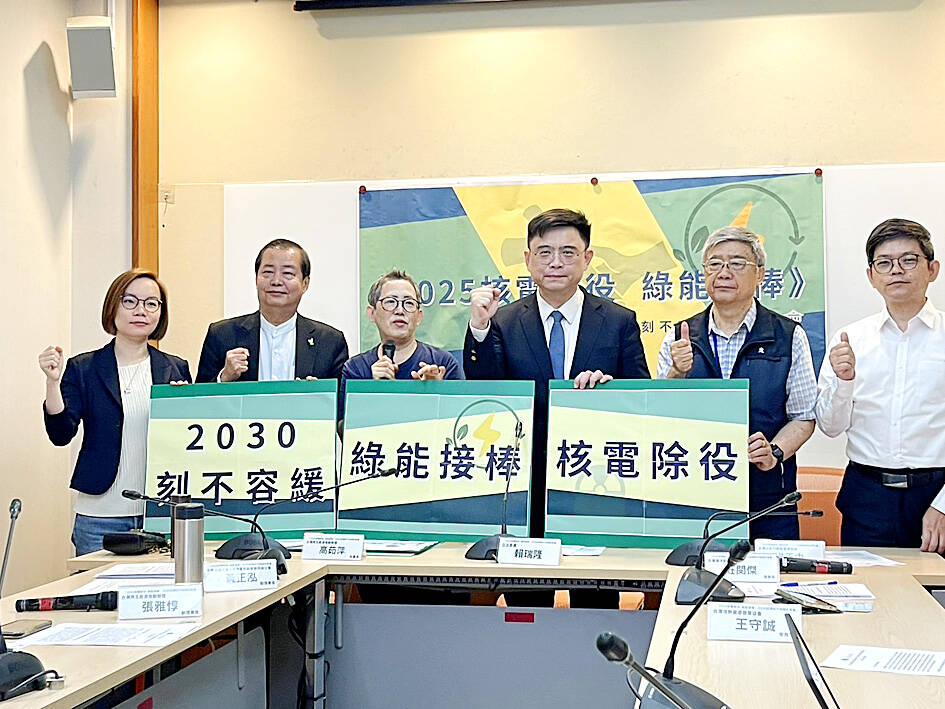Representatives of the green energy sector yesterday urged the government to accelerate the development of renewable energy sources after Taiwan became the first nuclear-free country in East Asia after shutting down its last nuclear reactor on Saturday.
The shutdown of the No. 2 reactor at Pingtung County’s Ma-anshan Nuclear Power Plant is the prelude to the “nuclear-free homeland” era, Democratic Progressive Party Legislators Lai Jui-lung (賴瑞隆) told a news conference, attended by the Taiwan Renewable Energy Alliance (TRENA), along with representatives from green energy sectors.
Such an energy transition policy was carefully planned with safety, sustainability and global trends in mind, Lai said.

Photo courtesy of Lai Jui-lung’s office
The government continued to bolster the development of renewable energy by establishing the Renewable Energy Development Act (再生能源發展條例), following the legislation of the Basic Environment Act (環境基本法), he said.
The proportion of power generation from renewable sources rose to 14.6 percent in March from 4.8 percent in 2016, he said.
The installed capacity of renewable power generators amounted to 35 percent of the total installed capacity of all power generation facilities last year, which would provide stable electricity in place of nuclear power, he said.
The government would cooperate with industries and the public to achieve the goal of boosting the proportion of green power use to 30 percent by 2030, as well as lead Taiwan to a net zero emissions, sustainable future, Lai said.
Taiwan has become the fifth-largest offshore wind power-using country, and had the most newly constructed wind power facilities last year, TRENA vice chairwoman Chang Ya-tun (張雅惇) said.
PV Generation System Association vice chairman Huang Cheng-hung (黃正泓) said that solar power is the fastest-growing renewable energy source worldwide, with an additional capacity of 447 gigawatts (GW) last year, accounting for 75 percent of global green energy growth last year.
Geothermal energy is promising and competitive renewable energy, of which the commercialization costs are expected to be lower than fossil fuel power by 2030, Taiwan Geothermal Association executive director Wang Shou-cheng (王守誠) said.
The development of small hydropower units in agricultural irrigation facilities and water distribution systems should be accelerated in line with the RE100 renewable energy initiative, Taiwan SHP Industries Alliance chairman Hong Cheng-chung (洪正中) said.
Ocean Energy Taiwan chairman Chuang Min-chieh (莊閔傑) said that Taiwan is surrounded by the sea and has the potential to develop 28GW of ocean energy, equivalent to 10 nuclear power plants.

The manufacture of the remaining 28 M1A2T Abrams tanks Taiwan purchased from the US has recently been completed, and they are expected to be delivered within the next one to two months, a source said yesterday. The Ministry of National Defense is arranging cargo ships to transport the tanks to Taiwan as soon as possible, said the source, who is familiar with the matter. The estimated arrival time ranges from late this month to early next month, the source said. The 28 Abrams tanks make up the third and final batch of a total of 108 tanks, valued at about NT$40.5 billion

Two Taiwanese prosecutors were questioned by Chinese security personnel at their hotel during a trip to China’s Henan Province this month, the Mainland Affairs Council (MAC) said yesterday. The officers had personal information on the prosecutors, including “when they were assigned to their posts, their work locations and job titles,” MAC Deputy Minister and spokesman Liang Wen-chieh (梁文傑) said. On top of asking about their agencies and positions, the officers also questioned the prosecutors about the Cross-Strait Joint Crime-Fighting and Judicial Mutual Assistance Agreement, a pact that serves as the framework for Taiwan-China cooperation on combating crime and providing judicial assistance, Liang

A group from the Taiwanese Designers in Australia association yesterday represented Taiwan at the Midsumma Pride March in Melbourne. The march, held in the St. Kilda suburb, is the city’s largest LGBTQIA+ parade and the flagship event of the annual Midsumma Festival. It attracted more than 45,000 spectators who supported the 400 groups and 10,000 marchers that participated this year, the association said. Taiwanese Designers said they organized a team to march for Taiwan this year, joining politicians, government agencies, professionals and community organizations in showing support for LGBTQIA+ people and diverse communities. As the first country in Asia to legalize same-sex

MOTIVES QUESTIONED The PLA considers Xi’s policies toward Taiwan to be driven by personal considerations rather than military assessment, the Epoch Times reports Chinese President Xi Jinping’s (習近平) latest purge of the Chinese People’s Liberation Army (PLA) leadership might have been prompted by the military’s opposition to plans of invading Taiwan, the Epoch Times said. The Chinese military opposes waging war against Taiwan by a large consensus, putting it at odds with Xi’s vision, the Falun Gong-affiliated daily said in a report on Thursday, citing anonymous sources with insight into the PLA’s inner workings. The opposition is not the opinion of a few generals, but a widely shared view among the PLA cadre, the Epoch Times cited them as saying. “Chinese forces know full well that